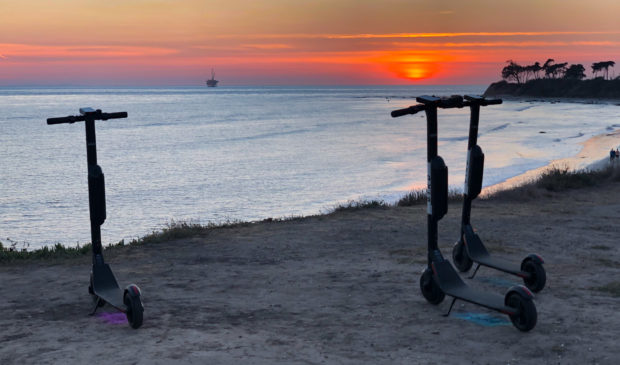Ellis attempts to get scooters and other contaminants out of city waterways
Thursday, January 23, 2020 by
Ryan Thornton When Council Member Paige Ellis was crafting the concept for a clean creeks initiative, she and her staff saw an opportunity to address one of the city’s more visible sources of creek and river pollution.
When electric scooters end up in creeks, whether intentionally or unintentionally, it presents a problem not only for the health of the city’s creek system, but also for those who rely on those dockless mobility devices to get around town, Ellis told the Austin Monitor.
City Council will consider a resolution from Ellis today that would direct the city manager to prepare a study with recommendations to improve the overall health and safety of city creeks, rivers and springs, giving specific attention to how the city can keep battery-operated mobility devices out of its waterways.
Micromobility providers are naturally invested in making sure their dockless units are on the streets for business. By city ordinance, the companies are required to retrieve a dockless vehicle from a body of water within an hour of it first being reported.
If, however, a scooter or bike sinks below the surface of the water and out of sight, those companies are off the hook, since they lack the special equipment and resources to search for and retrieve the vehicle. “Even when you think the creek looks clean, you’d be surprised how much junk is in it,” Ellis noted.
Ellis’ resolution aims to address the problem at every level by facilitating partnerships between all relevant city departments while seeking partnerships with any micromobility providers that are willing to join the city’s effort.
The city’s dockless mobility program is run by the Austin Transportation Department, but to the extent that the vehicles are inappropriately disposed of or left in city creeks or parks, they also fall into the purview of Austin Resource Recovery, the Watershed Protection Department, and Austin Parks and Recreation.
Ellis said she hopes coordination between these departments will help them discover the specific resources they need to quickly resolve those issues. Once a scooter is identified in a creek or inappropriate area, however, it will remain the responsibility of the provider to come and retrieve the vehicle.
Over email, a spokesperson from Lime, one of the companies offering dockless mobility services in the city, said that the company remains “committed to continue working with the city and our partners to educate the community about the harmful impact of vandalizing scooters and polluting the environment.”
Ellis also wants the city to consider enforcement and penalties for those who dump mobility devices into bodies of water. Fines for leaving a scooter in any waterway can be up to $2,000, but currently, Ellis said, there needs to be a police witness in order to prosecute.
The resolution aims to change that by potentially creating a webpage where citizens can post video footage of offenders illegally disposing of dockless vehicles. The city can’t force residents to do so, Ellis said, but the page could help empower citizens to take action when witnessing an event against the environment.
Video footage could potentially be used as permissible evidence in court, allowing the city to prosecute offenders. For that to work, however, the individual would need to be willing to appear in court and provide an identification of the offender in person.
Fines paid for illegal dumping of scooters could go into what Ellis calls the Save Austin’s Rivers Fund, a theoretical fund that could be used to improve water quality and mitigate the environmental impact of mobility device dumping.
Since September 2018, investigations from the spill response team at Watershed Protection have resulted in removal of 69 mobility devices from city waterways. In 2019 alone, the department’s Waller Creek Tunnel Program removed 342 mobility devices from the creek.
Lynne Lightsey with Watershed Protection told the Monitor that the batteries and engines in scooters can contain metals, acids, or toxic contaminants that can degrade and potentially harm aquatic life.
If the resolution passes, the city manager is directed to present the findings of the study by June 12, in order for recommendations to be considered in the next budget cycle.
Ellis said she is hoping for unanimous support from fellow Council members.
Photo by Glenn Beltz made available through a Creative Commons license.
The Austin Monitor’s work is made possible by donations from the community. Though our reporting covers donors from time to time, we are careful to keep business and editorial efforts separate while maintaining transparency. A complete list of donors is available here, and our code of ethics is explained here.
You're a community leader
And we’re honored you look to us for serious, in-depth news. You know a strong community needs local and dedicated watchdog reporting. We’re here for you and that won’t change. Now will you take the powerful next step and support our nonprofit news organization?



